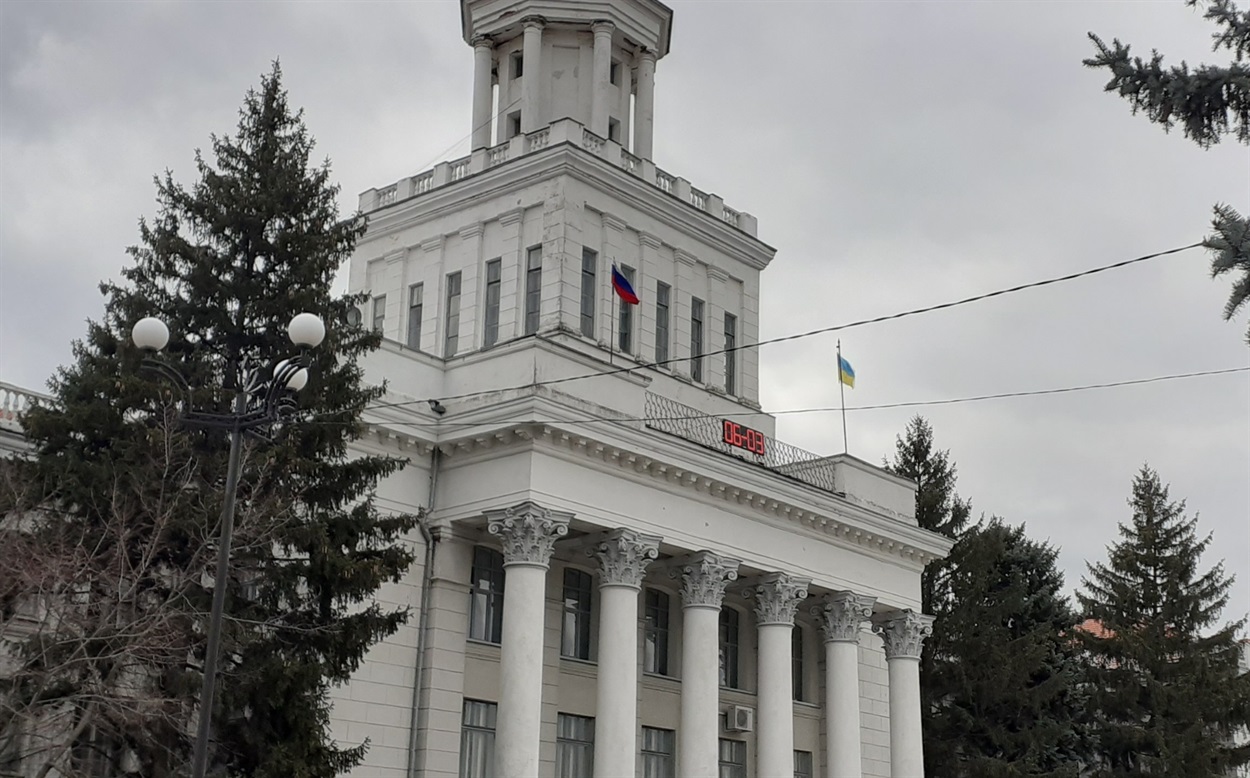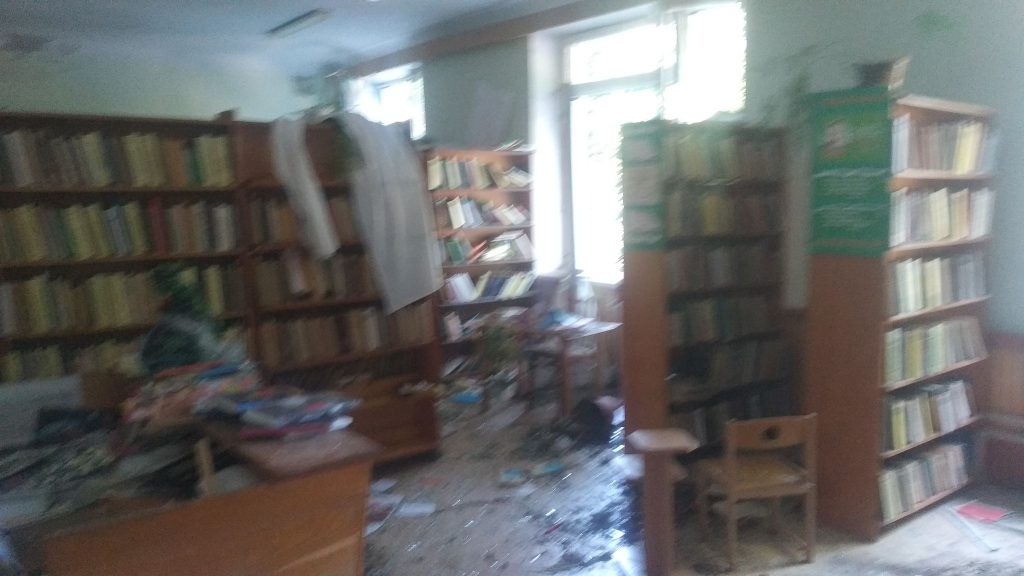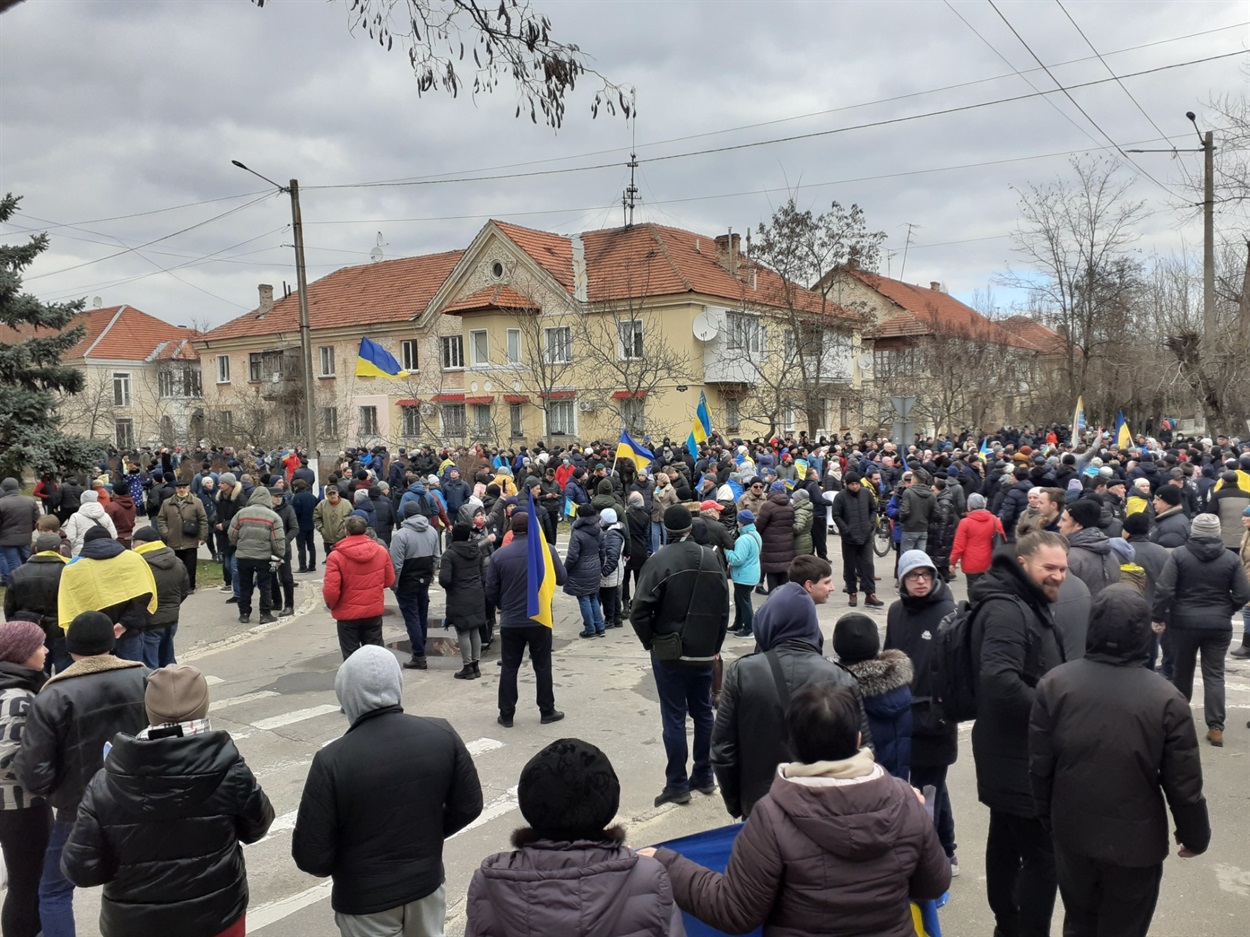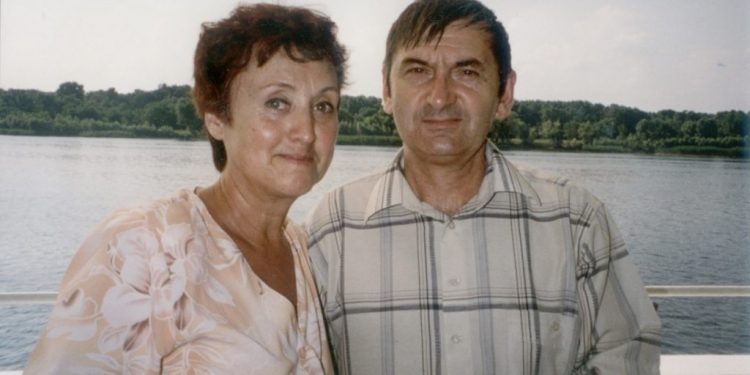Olexander Hunko spent nearly half a year in occupation in Novaya Kakhovka. He was detained three times by representatives of the occupying forces. The 70-year-old journalist was harshly pressured by FSB [Federal Security Service of the Russian Federation] agents – they held him captive for three days and tried to make him cooperate, but he refused and continued to run his website, Novakahovka.city.
Bound by the chains of time so cold,
Towards the abyss of darkness, I’m told,
You knew the calling to salvation’s grace,
Would lay you down in this earthly place…
These are lines from a poem written by Olexander Hunko after his time in Russian captivity in his hometown. The story of the head of a local internet publication became widely known in Ukrainian and domestic media later on. Despite the sudden Russian takeover of Novaya Kakhovka, few could have imagined that the occupation would become so threatening. In the first days of March 2022, the residents held pro-Ukrainian rallies, and two flags flew over the city council: the Russians had installed their own but left the Ukrainian one, hoping for loyalty from the “liberated” people. However, soon the occupiers began to abduct people, and among those kidnapped was Olexander Hunko.
Before the first day of the war, Nova Kakhovka was peaceful: no warnings from the authorities or evacuation moods. Therefore, the Russian invasion caught everyone off guard.
— We woke up on February 24th and learned that the war had started. Radio, television, the internet – everything was in turmoil, — recalls Olexander Hunko. — After 10 in the morning, I went into the city to see what was happening. On the central street, Dnipro Avenue, all the institutions were closed: the city prosecutor’s office, the court, the SBU [Security Service of Ukraine] department, and the police precinct. The gates of the SBU garages were open. So it became clear: they left in a hurry. I walked a bit further, past the police precinct, and on the road to the Kakhovka Hydroelectric Station, I saw Russian tanks and APCs. One man was riding a bicycle towards them. I told him, ‘Where are you going? Russians are already there.’ And he replied, ‘I heard about the war this morning, came from the village to the military enlistment office, and it was closed.’ Tank tracks were visible on the asphalt. Apparently, they were trying to enter the city but turned back when they reached the ‘Energia’ stadium. That’s how the war began for us.
Despite the city’s occupation, Olexander Hunko and his team, including his wife and daughter, as well as freelance correspondents and local bloggers, continued updating their website without compromise. They reported on events in Ukraine, the Kherson region and Nova Kakhovka using clear language, calling war what it was and occupiers by their names. Friends cautioned Hunko to tone down his writing, fearing repercussions and suggested seeking refuge, but he stood firm.
— I said I wouldn’t go anywhere; I’ll stay at home and work. I’m not afraid of them – let them be afraid of us. They came here as invaders, so why should we be afraid here? — explains the journalist his civic position.
But the warnings turned out to be well-founded. On April 3rd, Russians did come to the editor. They searched his apartment, confiscated his laptop, smartphones, a landline phone, and checked all the flash drives. The homeowner was taken to the police department, where the occupiers had set up a military police station. He was locked in one of the rooms, chained to a radiator, and placed on a hard wooden chair. It was absolute humiliation. In such a position, as Olexander Petrovych describes, he spent three days. He was fed only once during this time, on the second day, with military porridge. Sleeping was impossible. Walking as well. The guards took the prisoner to the toilet three or four times a day. This was the entire movement during the day. And for all three days, officers of the FSB interrogated the detainee.

— At the very first interrogation, they confronted me about calling them ‘orcs,’ claiming it was offensive to them. They also questioned why I was only using Ukrainian sources for information about the war and not using Moscow-based ones, — recalls Olexander Petrovych.
The FSB officers were interested not only in local media but also in what the detainee knew about local activists. The occupiers had lists of them and wanted to know who’s who.
— I explained that they weren’t ‘Banderites’ [supporters of Stepan Bandera’s nationalist ideology] or ‘Nazis,’ but people with an active life stance who were fighting against the local government’s tyranny, organizing civil actions, and so on, — says Hunko. — They also extensively questioned me about local participants in the Anti-Terrorist Operation (ATO). I told them I didn’t know any of them because I hadn’t attended any city events for about three years. Across from the ‘solitary confinement’ where I was chained, there was a room where they brought people every day and tortured them. I heard horrifying sounds: screams, blows, the sound of bones breaking… Later, even after I was released from captivity, no one approached me as a journalist from among the victims. People were very suppressed and tried not to talk about it to anyone except their closest friends.
Later, the occupiers offered him a chance to “atone for his guilt” through collaboration – to become the editor of a new occupation newspaper. The journalist declined, citing his age and health. Eventually, they promised to release him, but with one condition: Hunko had to record a video apology for calling them occupiers and pledge that Novakahovka.city would cooperate with their military administration.

Interview at Gunpoint
Regrettably, Olexander Hunko had to comply with this demand to protect his life and future freedom. The video was recorded in his home office, lasting about an hour and a half, then edited down to three minutes. The interview was conducted under duress: two armed officers faced Hunko, positioned behind the Russian correspondent and videographer, with another officer standing behind him. The edited video framed it as a “preventive conversation” with the newspaper editor. On camera, the website editor had to express willingness to cooperate with the military administration in informing the population about critical city events. He also had to acknowledge his error in labeling the Russians as occupiers since a journalist “should refrain from making judgmental or offensive statements.
However, this only helped temporarily. After that, Olexander Petrovych was detained two more times. The second time was after May 9th. He was called to the city hall by phone, where the same officers were present, one of whom introduced himself as Sayan. (Hunko had his gadgets returned to him the day before.) They suggested he write for their newspaper and promised good pay. Hunko refused as best as he could. The occupiers advised him to think about topics and then meet.
— Fine, — I said, — I’ll think about it, — Hunko recalls. — Of course, I had no intention of ‘thinking.’ I just wanted to buy some time. We, the residents of Nova Kakhovka, were hoping that we would be released in the next month. In May, we thought we’d be free by June, and so on. But it was becoming increasingly clear: the war was dragging on.
The third time, on July 10th, the website editor was arrested on the street by the occupant’s police. They took him to a police station, where the same officers inquired about his articles for the newspaper. Hunko explained his illness and medical visit, which was truthful. However, they subsequently barred him from working.
— In the end, the officer who conducted the interrogation said, ‘All right. I understand everything. If it were me, and they attacked Russia, I would be for my country too. But we forbid you from doing journalism at all. So that none of your articles appear anywhere,’ recounts the journalist.
They confiscated Olexander Petrovych’s press card from the National Union of Journalists of Ukraine and let him go. Despite this, he continued working on the website but with extreme caution, striving to maintain neutrality in his city reports. During this period, his daughter was evacuated abroad, while his wife remained at home, though she urged to leave due to her worsening health from constant stress.
In August, when FSB agents who had dealt with Hunko were sent to Kherson, they were replaced by Kadyrovites [refers to individuals loyal to Ramzan Kadyrov, the head of the Chechen Republic in Russia]. These individuals detained the same people and subjected them to harsh treatment. To prevent another capture and in response to pleas from family and colleagues in the free territory, Hunko decided to leave the city. Before leaving, he sent a letter to the prosecutor of the evacuated Kakhovka district prosecutor’s office detailing the circumstances of his arrest as requested.

Support from Colleagues and Journalism Organizations – Grants and Funds
When Hunko contacted the first transport provider, they turned out to be a scam and disappeared after taking an advance payment. The second option was a private microbus service charging 10,000 UAH per person from Nova Kakhovka to Zaporizhzhia. Hunko’s daughter sought financial help from fellow evacuees and initiated a fundraising campaign to cover her parents’ journey. Thanks to the community’s support, they managed to pay for their departure. On August 16th, the Hunko couple left the city, spent three days near Vasylivka (approximately 50 km from Zaporizhzhia), and arrived in Lviv on August 21st.
During the occupation, advertising revenue on the website decreased significantly. Financial survival was aided by the Agency for Local Media Development, under whose auspices the website was created through a grant program in 2017. In the spring of 2022, as part of a grant program to support media outlets that continued to operate during the occupation, the agency found a donor who paid 30,000 UAH for materials published in March.
In Lviv, Olexander Hunko received support from journalism organizations, including 3,400 UAH each from the National Union of Journalists of Ukraine and the Independent Media Workers Union. The Lviv Media Forum provided them with accommodation for four months and acquired a laptop, albeit an old one, to assist in their work. Additionally, Hunko secured a four-month scholarship from a German donor through a grant. Colleagues and friends also extended their help. These forms of assistance allowed him to continue running the website and informing readers about life in occupied Nova Kakhovka and the Kherson region. Furthermore, Hunko received a letter from the National Union of Journalists of Ukraine, stating that he had been recommended for emergency financial assistance of $600 USD from UNESCO, alongside 160 other Ukrainian journalists, as evaluated by an international jury.
This series, titled Executed Free Speech, is created as part of a project Drawing Ukrainian And International Audience’s Attention To Serious Violations Of Human Rights And Crimes Against Journalists And Mass Media By The Russian Federation, which is performed by the National Union of Journalists of Ukraine, with support from the Swedish non-profit organization Civil Rights Defenders.
JOURNALISTS ARE IMPORTANT. Stories of Life and Work in Conditions of War is a cycle of materials prepared by the team of the NUJU with the support of the Swedish human rights organization Civil Rights Defenders.
#CRD

 THE NATIONAL UNION OF
JOURNALISTS OF UKRAINE
THE NATIONAL UNION OF
JOURNALISTS OF UKRAINE
















Discussion about this post